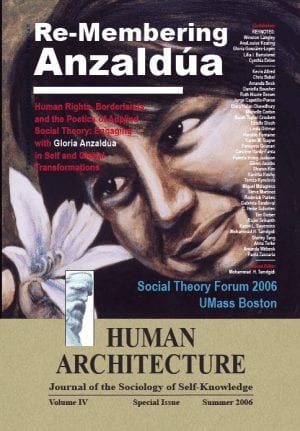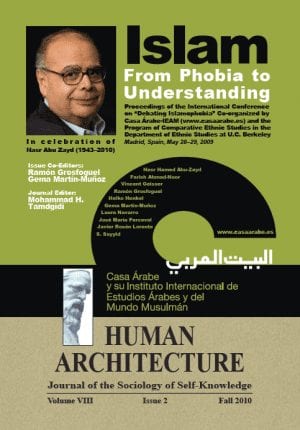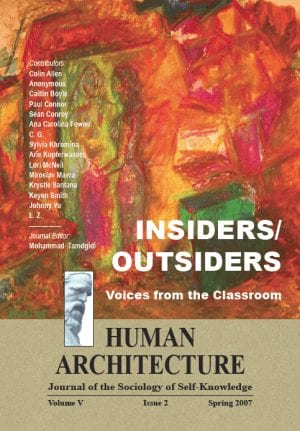Re-Membering Anzaldúa: Proceedings of the Third Annual Social Theory Forum April 5-6, 2006, UMass Boston
$80.00 – $140.00
This Summer 2006 (IV, Special) issue of Human Architecture: Journal of the Sociology of Self-Knowledge includes the proceedings of the Third Annual Meeting of the Social Theory Forum (STF), held on April 5-6, 2006, at UMass Boston on: “Human Rights, Borderlands, and the Poetics of Applied Social Theory: Engaging with Gloria Anzaldúa in Self and Global Transformations.”

All the sections of this publication can be read online by logged-in members of the OKCIR Library with a valid access. In that case click on any section in the table of contents below, and then click on the large PDF icon at the bottom of that page to access the publication section. Alternatively, you can purchase this publication as offered below.
Description
Re-Membering Anzaldúa: Human Rights, Borderlands, and the Poetics of Applied Social Theory: Engaging with Gloria Anzaldua in Self and Global Transformations (Proceedings of the Third Annual Social Theory Forum—April 5-6, 2006, UMass Boston)
HUMAN ARCHITECTURE
Journal of the Sociology of Self-Knowledge
Volume IV • Special Issue • Summer 2006
Journal Editor:
Mohammad H. Tamdgidi, UMass Boston
Description
This Summer 2006 (IV, Special) issue of Human Architecture: Journal of the Sociology of Self-Knowledge includes the proceedings of the Third Annual Meeting of the Social Theory Forum (STF), held on April 5-6, 2006, at UMass Boston on: “Human Rights, Borderlands, and the Poetics of Applied Social Theory: Engaging with Gloria Anzaldúa in Self and Global Transformations.” Walking along and crossing the borderlands of academic disciplines, contributors engaged with Anzaldúa’s gripping and creative talent in bridging the boundaries of academia and everyday life, self and global/world-historical reflexivity, sociology and psychology, social science and the arts and the humanities, spirituality and secularism, private and public, consciousness and the subconscious, theory and practice, knowledge, feeling, and the sensual in favor of humanizing self and global outcomes. Central in this dialogue was the exploration of human rights in personal and institutional terrains and their intersections with human borderlands, seeking creative and applied theoretical and curricular innovations to advance human rights pedagogy and practice. Keynote contributions by: Winston Langley, AnaLouise Keating, Gloria González-Lopéz, Lilia I. Bartolomé, and Cynthia Enloe. Contributors include: Sarah Taylor Crockett, Amanda Bock, Caroline Hardy-Fanta, Amanda Witbeck, Tereza Kynclová, Paola Zaccaria, Panayota Gounari, Glenn Jacobs, Jorge Capetillo-Ponce, Haroldo Fontaine, Ruth Nicole Brown, Estelle Disch, Pamela Irving Jackson, Roderick Parkes, Kavitha Koshy, Steve Martinot, Linda Dittmar, Miguel Malagreca, Kevin Allred, Gabriela Sandoval, Sharon Kim, Michelle Corbin, Karen M. Gagne, Rajini Srikanth, Elora Halim Chowdhury, C. Heike Schotten, Daniella Boucher, Chris Bobel, Tim Sieber, Karen L. Suyemoto, Shirley Tang, Anna Torke, Joaquin Alejandro Newman, and Mohammad H. Tamdgidi (also as journal editor-in-chief). Human Architecture: Journal of the Sociology of Self-Knowledge is a publication of OKCIR: The Omar Khayyam Center for Integrative Research in Utopia, Mysticism, and Science (Utopystics). For more information about OKCIR and other issues in its journal’s Edited Collection as well as Monograph and Translation series visit OKCIR’s homepage.
The various editions of Re-Membering Anzaldúa: Human Rights, Borderlands, and the Poetics of Applied Social Theory: Engaging with Gloria Anzaldua in Self and Global Transformations are also available for ordering from all major online bookstores worldwide (such as Amazon, Barnes&Noble, and others).
Contents
ix— Editor’s Note: “Re-Membering Anzaldua”
Mohammad H. Tamdgidi, University of Massachusetts Boston
KEYNOTES
1— The Unbordered Borders
Winston Langley, University of Massachusetts Boston
5— From Borderlands and New Mestizas to Nepantla and Nepantleras: Anzalduan Theories for Social Change
AnaLouise Keating, Texas Woman’s University
17— Epistemologies of the Wound: Anzalduan Theories and Sociological Research on Incest in Mexican Society
Gloria González-Lopéz, University of Texas at Austin
25— The Struggle for Language Rights: Naming and Interrogating the Colonial Legacy of “English Only”
Lilia I. Bartolomé, University of Massachusetts Boston
33— Cynthia Enloe Student Roundtable: “What International Feminist Activists Have Contributed to Anti-Militarist Social Theorizing”
Sarah Taylor Crockett, Amanda Bock, Caroline Hardy-Fanta, Amanda Witbeck
University of Massachusetts Boston
BORDERLANDS OF LANGUAGE AND CULTURE
43— Constructing Mestiza Consciousness: Gloria Anzaldua’s Literary Techniques in Borderlands/La Frontera—The New Mestiza
Tereza Kynclová, Charles University, Czech Republic
57— Translating Borders, Performing Trans-nationalism
Paola Zaccaria, University of Bari, Italy
71— How to Tame a Wild Tongue: Language Rights in the United States
Panayota Gounari, Universiity of Massachusetts Boston
79— Finding the Center: Constructing the Subaltern Master Narrative
Glenn Jacobs, Universiity of Massachusetts Boston
87— Exploring Gloria Anzaldua’s Methodology in Borderlands/La Frontera—The New Mestiza
Jorge Capetillo-Ponce, Universiity of Massachusetts Boston
BORDERLANDS IN EDUCATION
95— …y no se lo tragó la tierra:
A Bilingual Analysis in Terms of Mikhail Bakhtin’s “Discourse of the Novel”
Haroldo Fontaine, Florida State University
105— Mentoring on the Borderlands:
Creating Empowering Connections Between Adolescent Girls and Young Women Volunteers
Ruth Nicole Brown, University of Illinois at Urbana-Champaign
123— Nurturing the Nepantlera Within: Working in the Borderlands of Our Prejudices
Estelle Disch, University of Massachusetts Boston
GLOBALIZATION, HUMAN RIGHTS, AND BORDER SOCIAL MOVEMENTS
131— Glorbalization and the Securitization of Immigration Policy: Competing Influences on Immigrant Policy in Germany, France, Britain and the United States
Pamela Irving Jackson and Roderick Parkes, Rhode Island College and Center for European Integration (ZEI), Germany
147— Nepantlera-Activism in the Transnational Moment: In Dialogue with Gloria Anzaldua’s Theorizing of Nepantla
Kavitha Koshy, Texas Woman’s University
16—3 Social Justice Movements as Border Thinking: An Anzaldúan Meditation
Steve Martinot, San Francisco State University
177— Reaching Across No-Man’s-Land: The Israeli/Palestinian Conflict in Yuli Cohen-Gerstel’s Film, “My Terrorist”
Linda Dittmar, University of Massachusetts Boston
BORDER WOUNDS AND WRITING QUEER
187— Writing Queer Across the Borders of Geography, Desire, and Power
Miguel Malagreca, University of Buenes Aires, Facultad de Psicologia, Catedra de Etica y Derechos Humanos
205— Resisting Legibility on the Borders: Opposition to the Violent Intersections of Race, Nationality, and Sexuality
Kevin Allred, University of Massachusetts Boston
217— On Skin as Borderlands: Using Gloria Anzaldua’s New Mestiza to Understand Self-Injury Among Latinas
Gabriela Sandoval, University of California at Santa Cruz
SPIRITUAL AND DISCIPLINARY BORDERLANDS
225— The Development of Second Generation Korean American Spirituality
Sharon Kim, California State University at Fullerton
239—Facing Our Dragons: Spiritual Activism, Psychedelic Mysticism and the Pursuit of Opposition
Michelle Corbin, University of Maryland, College Park
249—Fighting Amnesia as a Guerillla Activity: Poetics for a New Mode of Being Human
Karen M. Gagne, Binghamton University
265— Anzaldua’s Sociological Imagination: Comparative Applied Insights into Utopystic and Quantal Sociology
Mohammad H. Tamdgidi, University of Massachusetts Boston
287— Moderator Commentary: Not Just Surviving but Fully Relishing the Borderlands, Defiantly and Triumphantly
Rajini Srikanth, University of Massachusetts Boston
FEMINIST FUTURES/GLOBAL STRUGGLES
291— Global Feminism: Feminist Theory’s Cul-de-sac
Elora Halim Chowdhury, University of Massachusetts Boston
303— Revolutionary Futures: Nietzsche, Anzaldua, and Playful “World”-Travel
C. Heike Schotten, University of Massachusetts Boston
321— Small Victories, Lasting Change: Harriet Martineau, Slavery, and Women’s Rights
Daniella Boucher, University of Massachusetts Boston
SYMPOSIUM
This Bridge We Are Building
333— Introduction: This Bridge We Are Building: “Inner Work, Public Acts”
Chris Bobel, Tim Sieber, Karen L. Suyemoto, Shirley Tang, and Anna Torke, University of Massachusetts Boston
339— Processes of Emergence and Connection: Interrelations of Past, Present, and Future in Journeying for Conocimiento
Karen L. Suyemoto, University of Massachusetts Boston
347— Inner Work, Public Acts: The Conocimiento of Art
Anna Torke, University of Massachusetts Boston
355— Knowledge, Learning, and Teaching: Striving for Conocimiento
Tim Sieber, University of Massachusetts Boston
359— “Take This Course If You Like to Be Brainwashed”: Walking the Knife’s Edge Between Education and Indoctrination
Chris Bobel, University of Massachusetts Boston
365— Keeping the Path of Conocimiento Real and Grounded
Shirley Tang, University of Massachusetts Boston
371— Concluding Reflections—A Dialogue: This Bridge We Are Building: “Inner Work, Public Acts”
Chris Bobel, Tim Sieber, Karen L. Suyemoto, Shirley Tang, and Anna Torke, University of Massachusetts Boston
377— Cover Art: Introducing Joaquin Alejandro Newman and the Forrealism Movement
379— About the Social Theory Forum (STF)
STF-2006-Anzaldua-Poster-1
STF-2006-Anzaldua-Poster-2
STF-2006-Anzaldua-Program
STF-2006-Anzaldua-CFP






